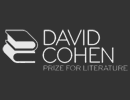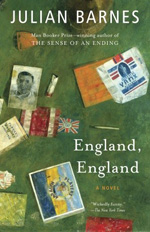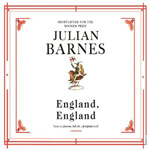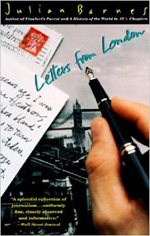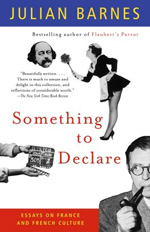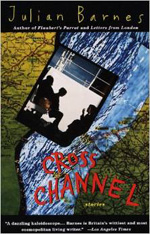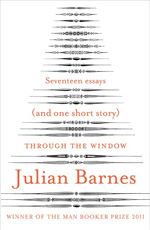RESOURCES / SHORT STORIES / ESSAYS / INTERVIEWS / TRANSLATIONS
Robert Birnbaum Interviews Julian Barnes
© 1999 Robert Birnbaum
Robert Birnbaum: England, England has been out a while in Britain. Did you do much publicity for it there? Do you need to?
Julian Barnes: I give readings in bookshops and gave two interviews. Two press interviews and probably a radio interview. That's what I tend to do...
RB: It's not quite a year that you have been involved in talking about the novel?
JB: No, no. I've only promoted in Britain, so far. And now Canada. So I've had other things to think about in the meantime.
RB: What do you make of the fact that British writers are described as being 'short listed' for the Booker Prize, but in the U.S.A. writers are not referred to as being 'short listed' for the Pulitzer Prize or the National Book Award? Here, if you don't win, despite the publisher's spin, you're a loser.
JB: Well, that certainly is how you feel when you don't win. You feel like...it's a system which creates six winners and five losers. Six winners one month and five losers the next. The thing is -- other prizes are following suit, and they're also having short lists. I don't mind the short list for the Booker. The thing I object to is the way the judges all talk to the press about it. I think they should just say "This is the short list" and a month later say "This is the winner" and that's it. Say no more.
RB: Can you distinguish the place of British writers in Britain and American writers in America?
JB: Your guys write longer books. (Both laugh)
RB: We have more paper. It can't be because they have more to say...
JB: I get the sense your writers have more -- and that's partly why they write longer books -- they have more natural self-confidence. They know that American culture is listened to worldwide. They, I assume, mostly think that the novel in English is now American. I think we are much more, partly because of our imperial and colonial and Commonwealth history, we're much more divided about it all. I think British writers of one or two generations ago would have thought the English novel was the real novel in English and the American novel was sort of an upstart. Now British writers would say that the British novel is just one of the forms of the novels in English around the world. I don't think we would bow to the American novel while respecting many of its writers. The Indian novel -- or the novel written in English by people of Indian origin whether living in India or living in Europe or living in California -- is obviously a very rich field at the moment.
RB: Was there a period in Britain when there was a debate about the mortality of the novel? Were funerals held for the novel?
JB: No, nothing serious. Every so often everywhere someone writes an article claiming the death of the novel, "Why write novels when you can have this, when you can have that?" And novels go on being written and read, it seems to me, in increasing numbers, and of increasing popularity. I don't see it at all, actually. And I think this very diversity of the -- if you're talking about the death of the novel in English -- the very diversity of it is all the better for it.
RB: American authors are published simultaneously in translation in 8, 14, 24 languages. Does that happen for British writers?
JB: Yea. Not instantaneously, but within the next year or two. I once counted up and it's between thirty and forty that I've been translated into. It doesn't mean that every book is translated into every language.
RB: Isn't it peculiar that first time novelists are translated into fourteen languages? Does that speak to a hunger for American culture?
JB: Yes. I think it speaks to the hunger, but it also speaks to the efficiency of international book fairs. There's always a buzz book at a book fair. "Have you bought the Schlumberger?" "Oh, shit, no! I haven't bought the Schlumberger! I better buy it." A famous case of my friend and ex-publisher Liz Calder (used to work for Cape, now works for Bloomsbury) bought Isabel Allende's novel thinking she was the daughter of the president. But then, when she wasn't, it didn't make any difference.
RB: He was her uncle. Isabel Allende is the number one selling foreign author in Denmark.
JB: I know. It's very odd isn't it? That side of it is actually quite fun in that it can mean that different books of yours play differently in different countries. You think, "Ah," this is sort of true, "that does mean my novels are traveling, if the one that didn't do so well in England did well in America and that one they quite suddenly saw differently in Denmark." I like all that.
RB: You are reputed to be a great lover of France. Other than to France, do you travel much to talk about your work?
JB: Oh yes. I think I have to put a stop to it. You could go to every European country every time you published a novel. And come to the States and Canada. And you go to Australia every three or four years. I've been to Spain, Italy, France, Germany, Denmark, Sweden, and so on. I'm going to Holland in September, Germany in November, and France in January for this book.
RB: Putting aside the business, would it be wretched to view this as a globalization of literature?
JB: Yes, I think in Europe certainly people are much...it will obviously vary from country to country. Like the Dutch who speak almost every language anyway were always up to date with what was going on in each country's literature. We've always been traditionally the most sluggardly of European nations in terms of translating things. The French for all their supposed chauvinism have always been very open to foreign fiction. And you are right, things are translated much more quickly nowadays. Yea, if you call that globalization... It always seems to be used in a pejorative sense, but perhaps this an example of good globalization. When you think how slowly, and often inadequately, novels were translated in the past, in the 19th century and so on, the idea of having to wait...there's a great Spanish novel by a man called Leopoldo Allas called Laragenta [sic]. Have you ever come across it? It's a sort of Spanish Madame Bovary written in the 1880's and first translated into English in 1986. It's one of the great 19th century novels and unavailable to anyone who didn't read Spanish. So, it's good. Of course, lot's of crap is going to be [published] the first time out in fourteen countries.
RB: And this trend is driven by something other than missionary zeal to get the works out there?
JB: Economics. Economic zeal and fashion. Every so often you hear a phrase going round... Whenever I see my publisher's catalogue in Spanish, he always refers to me, Ian McEwan, Graham Swift, and Martin Amis as "The Four Musketeers of British Literature." I don't even question it or mock it. Then there's the Salman Rushdie line about "the Empire strikes back," which was a joke when he said it but has been taken up seriously. And then you travel in Europe and they say, "Seems to me your generation of British writers, there's a real new energy and vision there." And I say (laughing), "Yes, yes."
RB: In a recent piece in the New York Times Book Review, Jim Harrison, in describing writing from a women character's point of view, characterizes post modernist fiction: "The fodder of post-modernist fiction is nifty guys at loose ends." In England, England, Martha, one of the main characters in your lampoon, seems to fit Harrison's picture...especially as she returns to this preposterous idyllic...
JB: Not particularly idyllic [Barnes pronounces it "id-illic"]...
RB: Well, Anglia is not...
JB: Pre-industrial. It's not meant to be an idyll. It's quite boring, you see. She's bored.
RB: Why did Anglia seem so charming?
JB: (laughs) You're not the first to say idyll, but I resist it. I didn't write it as an idyll, I actually wrote it as...
RB: Americans probably use the word differently. I say 'eye-doll', by the way. How important was Martha to this story?
JB: She was there from the beginning. Crudely, the initial idea was to play the private life -- the search for truth and authenticity in the private life through a search for love -- against the large farcical satirical whatever-you-like-to-call-it public story of fabrication, falsification, replication, and so on and to run the one through the other. And to use the most extremes of tone, the most extreme variation of tonality between the two stories and try and make it play. That was the idea and the challenge of it. I want you to...one of the reasons she [Martha] had to be there was that otherwise you would have a...
RB: Cartoon?
JB: Yes, a cartoon without any human content. There are cartoons which do, like Doonesbury. Otherwise, it could be just a brassy farcical jolly sort of romp. That's why I deliberately started with her life, her growing up, as realistically as possible -- to situate and orient the reader and have something to follow.
RB: The idea of turning the Isle of Wight into a theme park is much more something Americans would do. Is it the case that British civilization has sunk to the same disgusting consumer driven level?
JB: Yea, we have... I was talking to my builder the other day. He went on a week's holiday and he went to a place which is somewhere in the Midlands. Within it, it was as if he was on a tropical island and it was a completely enclosed environment. Without having to flap your passport you went abroad. Completely fake. He had a wonderful time. We do all the country house industry stuff: thatched cottage, cream tea stuff. No, we're quite good at it. We've been doing [it] a lot longer than you have, so we don't do it in such an obvious way. We don't yet build Africa as Disney has done. It's partly because things are nearer us. Las Vegas has a replica Venice and of Paris, but it's not very far for us to see the original.
RB: You made a list of 50 quintessences of England. Had you thought of 50 American quintessences?
JB: Gosh, I'd have to give that a long think and be very politic.
RB: Do you still do the Letter from London kind of thing?
JB: Oh, being a foreign correspondent in my own country? No, I haven't. I did that for five years and stopped it.
RB: Because it was a natural time to stop, or it exhausted its interest for you?
JB: It took a lot of time and a lot of writing energy. They were big pieces and you had to stop work on anything else you were doing for up to a couple months. Things were coming round again. You cover one general election you don't want to cover the next one. You write about the royal family once you don't want to write about them again. I had a terrible fear the Queen Mother was going to die and they were going to ring me up and say “we want you to write about the Queen Mother”. I said I have to get out of it before she dies. Of course, she's going on solid as ever. Hip replacements every so often.
RB: You came to the States a few years ago to teach at Johns Hopkins. What was your experience like in Baltimore?
JB: I always wanted to have a spell living in America. But I wanted to live in an American city. I didn't want to live in New York -- or the West Coast. I didn't want to live in an Ivy League replica of Cambridge. I was practically the only Englishman in Baltimore. It was a true American city, which had its good times, had bad times, and now having some more good times. So I enjoyed all that side of it. I liked my graduate students. They were very clever and very nice. And it was nice just going into an academic environment for a change. I'm not...you know my brother is a full time academic, but I left it behind a long time ago.
RB: What do you make of Stephen Dixon [on faculty at Johns Hopkins], who is another one of those wonderful writers who are ignored except by the cognoscenti?
JB: I think there are similar cases in all literary cultures. On the whole, in the novel, it's a sort of slow curve. In poetry there are only three places on the podium in Britain and those three poets make a living. All the others are just scrabbling around. In the theater, the curve goes up very sharply, because you make vast amounts of money if you have anything running for a few months anywhere. But, if are on the fringe, you don't make anything. But the curve in the novel, on the whole, goes up more slowly. On the whole you make a bit more as you go on and on the whole the gradations of fame are not so violent. There are always cases of honorable writers who have to do another job to make a living. That's always been the norm. I think we're slightly spoiled. And I think American, on the whole, writers are the most spoiled of all. The difference between an American writer and a British writer -- I can't remember who said -- when an American writer publishes a novel and wins a prize or something like that, has a success, he or she buys a Volvo -- an English writer buys a typewriter.
RB: Is the designation 'mid-list author' used in Britain?
JB: Yes, it is. That's what's being squeezed, it seems to me. When I started -- I published my first novel in 1980 -- that graph was much more in place. And now it seems to me that perhaps there's a break in the middle and there's a second ascent and there's a vertical walled scale in the middle somehow. And that's where the mid-list was. Also, obviously, there's more bottom line stuff and you get fewer chances to write your breakthrough book than you did then. And they think in terms of breakthrough books. I'll give you two examples, both writers I revere, both Anglo-Irish: Brian Moore and William Trevor. Both of them have never written a book as a result of which says "by the author of". But both have, over forty years, built an incredibly distinguished body of work. You can't call them mid-list, because they are more classy than that and they're probably more successful than mid-list. But that sort of literary career is harder to do now. The publishers will be looking for something to be filmed.
RB: I was told a story recently about an Oprah author. His agent was shopping a book and was turned down by numerous publishers. They resubmitted the book under another name and publishers then wanted to buy the book. And then when they informed the publishers. They were told that he wasn't wanted because he was a mid-list author. It does make publishing judgements suspect.
JB: Yes, but publishing has always been like that hasn't it? It's always backwardly validating. They're always backing their hunches and they're slightly more canny about it than an ordinary reader may be. But they're bound to make lots of mistakes. Doris Lessing submitted something under another name and they turned it down. And then she submitted under her name and they, of course, accepted it. I thought she didn't come out of that too well.
RB: On the dust jackets of your books no mention is made of your Dan Kavanagh books. Have you disassociated yourself from them?
JB: I wrote the last one in 1986 and I'm not going to write any more. They've mostly been remaindered.
RB: You know you are not going to write any more because ...?
JB: Yes. I liked doing them. I had an excess of energy at the time, which is why I was doing them, and then I didn't. Had they been more successful, had I written more of them probably... I started off writing three in four years. And then there was a pause, and then there was a three-year gap... They were perfectly reasonably successful in their own right, but my books are more successful.
RB: Has any one asked you to republish them?
JB: They're still in print. There is a Duffy Omnibus in Penguin back home. I'm not denying them or repudiating them. I think they're quite jolly. But I wrote each of them in about a fortnight. The combined writing time on the omnibus is a sixth of the time of the novel I wrote the quickest. So, I'm perfectly happy to sign copies when they're put in front of me. Brian Moore wrote thrillers when he started off and he always refused to sign -- he wrote them under a pseudonym -- them when they were put in front of him later. I do a different signature -- a barely literate signature.
RB: Do you sign your name?
JB: No, Dan Kavanagh.
RB: Can you walk around London and not be recognized?
JB: Yea, sure.
RB: I have the impression English writers are more celebrated and visible than serious American writers.
JB: It's complicated because...when I was in Canada, I arrived on a Saturday. Monday went to CBC and got on the lift. As I was getting out of the lift a woman said, "Oh you're Julian Barnes de-dummty-dum." This morning I was queuing for the great snakey immigration queue in Toronto Airport -- as a middle-aged woman passed she said, "I'm a reader and de-dummty-dum-dum-dum." That would never happen in England. I liked it, and in both cases it happened first thing in the morning and it set me up. In England they wouldn't. People know me in my neighborhood, but they just treat me as a citizen. Probably only a couple of times in the last five years has some come up to me and said, "I like that book," out of the blue. It's not in the culture.
RB: For any occupation?
JB: If you're a sports star probably, if you're a musician. People who sit in quiet corners and read books tend not to rush up to you in the street.
RB: If you're Richard Bransen?
JB: You might get stoned...stones thrown at you.
RB: Seventy or eighty people showed up recently my neighborhood independent bookstore for a reading by Nathan Englander...
JB: Ah, I met him in London. He's a nice fellow. I haven't read all that book, but it looks very good to me. The stories I read I was very impressed by.
RB: Is writing this book an opportunity to unload your joke bag? Did you find yourself laughing as you were writing? JB (laughs): I tend not to. No, you're concentrating on making it work. I look at it as a serious book, but I admit it's also fast.
RB: Well, the character Jack is, as they say here, over-the-top.
JB: Yes, he's a big old-fashioned villain. He gets the best lines.
RB: You suggest that people forget the best sex they ever had. Is that true of other things also?
JB: I've never actually asked people. But I remember being struck -- when something similar to the episode when Martha gets the post card saying, "Rather the best fucking fuck in my life" -- someone saying something similar to me. And I thought, "I can remember who I loved the most..." There's sort of a black box effect. You can remember bad sex. I don't think I can remember the worst sex. Doubtless there are many contenders...
RB: The worst meal, the worst movie, the best movie, the best meal, the best wine, the best natural moment...
JB: You see, I think sex is different. You can say looking at the Grand Canyon, going to the top of Masada, things like that. You can certainly do your top ten natural sights. It's partly because sex is so contextual, after all.
RB: I took it to be a statement more about memory than about sex.
JB: Yes, well the whole book is about memory -- about personal memory and historical memory. That's what it opens with.
RB: This is relatively unimportant, but you managed to include the fact that Beethoven premiered four major pieces in one particular evening? I assume that's a true story. Were you waiting to put that in somewhere? Or did it just work out because Beethoven had some role in Sir Jack's life?
JB: I needed some figure for Sir Jack to compare himself which was preposterous and yet plausible in terms of himself and what he would compare himself to. And that may be an example of just egregiously bringing in some information which was fun. Which is always a danger when you have the information. The story about the policeman saying, "Beethoven doesn't look like" fits in with the general narrative. But that fits in in terms of Sir Jack being a patron of the arts and how all Beethoven needed was a proper manager and a proper entrepreneur and a proper backer -- like Sir Jack -- and he would have been okay. He would have been taken to an ear specialist and sorted that out as well.
RB: In your introduction to Letters from London you mentioned Charles McGrath editing your use of the word 'crepuscular'. Was there a prohibition about using a word more than twice in a year?
JB: Well, Chip is a wonderful editor and he was... It wasn't that you were not allowed to use a relatively obscure word, but he was sensitive to the times when, as a writer, you deliberately use an obscure word rather than using an obvious word. That can become a habit that can become a tick. He was quite right. He was a brilliant editor.
RB: You spent some time as a lexicographer?
JB: I did. I don't know whether it had any influence on me at all. Except in making me less prescriptive about language. And also less old farty and valetudinarian and pessimistic. There is this well-established English attitude toward language which is that the barbarians are at the gates. There was a time when even the local vicar would write perfect copperplate handwriting and express himself in Augustan prose. And there were these things called 'things' and these things called 'words' and all the words matched the things. Well, you just look at the language and it's not like that. And then these barbarians come in using words wrongly. Then the words all get mixed up. Look at the first Oxford Dictionary use of the word 'uninterested' and it's used in the sense of 'disinterested'. Look at the first recorded use of the word 'disinterested' and it's in the sense of 'uninterested'. So those two words have always been mixed up. It has nothing to do with the barbarians. And so on and so on and so on...
RB: Did you notice any linguistic gap when you taught at Johns Hopkins?
JB: Well, there was a gap because they were writing in American English and I exist in English English. But that might have been helpful to them, because a guy would turn out a piece of gen-x fiction and his colleagues in the writing group would all say this is gen-x and give it the thumbs down on a genre basis. And I, who hadn't read any gen-x stuff, would read it more objectively. It would seem a report from a stranger planet.
RB: In your own reading do you have any particular inclinations? Are you an equal opportunity reader?
JB: I'm an equal opportunity reader. As I'm in my fifties, I'm rereading more. I'm going back to what I read at eighteen. It's ridiculous to think you got everything out of Anna Karenina when you were eighteen. I go back to the 19th century a lot.
RB: You don't feel pressured to kept up with the onslaught of publication?
JB: I keep up with writers I respect and revere, sure. I don't feel that I have known what every writer amongst my contemporaries is up to. For a start, I read slowly. Also, I don't see literature as a breaking wave. The longer I live and the longer I read, the more we're points on a circle rather than anything linear. You can read 19th century novels which are just as bold and experimental as anything in the 20th century.
RB: In my talks with American writers, we rarely talk about the joys of rereading, but in my conversations with British writers it comes up.
JB: It may be a European thing. There's part of me when I'm reading fiction -- I want to read something which I can learn from still. So, if there's a smart semi-autobiographical first novel that comes out by some new kid on the block, sorry, but pass -- I haven't read all Edith Wharton yet.
RB: So what new fiction jumps over Tolstoy or Wharton?
JB: It's not inflexible, and you respond to what your friends say and what people tell you. And there's always the five-page test, after all. It does work. I get sent an awful lot of books in proof. I tend to look at all of them, if only cursorily.
RB: Why are you sent books?
JB: They're sent hoping I'll give them a puff. But I don't do that. It's a currency that so diminishes so quickly.
RB: Here it's call 'logrolling'.
JB: In my country, as well. Logrolling implies you know the guy or the women. It's perfectly respectable in some ways to give a quote for an unknown author who you think is jolly good and so you say, "'glittering new talent' - JB." Graham Greene used to give a lot of quotes. Anyone who wrote a Catholic novel, he would say, "'A thumping new masterpiece' - Graham Greene". I don't want to see my name on the backs of books in that way.
RB: Do you have a longer view of Britain's place in the world? Are you past the point of viewing Britain as what everyone aspired to?
JB: I don't know that people did aspire to wanting to be British. Did they? Maybe some members of the Commonwealth. Not in my lifetime. I was born the year before India got its independence. I feel totally post-colonial, if you can apply that to an Englishman. It's going to be interesting over the next thirty or forty years whether the United Kingdom breaks up. Tony Blair could well turn out to be the Gorbachev of Britain, the political figure who loosens things up. Once the process of giving Scotland its own Parliament has happened, if they enjoy it, why shouldn't they want more? And, as long as enough of them want it, then they should have it. I don't like the idea of inflexible nation states -- with inflexible borders.
RB: Is there anything the rest of the world looks to Britain or England for? Are there reverberations or is there any afterimage of leadership?
JB: I don't know. There's so much self-deception in Britain about this I hesitate to pronounce on it. You're the one to answer that. I can't think the 'Mother of all Parliaments", as we used to refer to the House of Commons, plays anymore at all. I suppose the vestiges of the Empire/Commonwealth survive in the fact that quite a lot of Commonwealth countries still -- the final court of appeal is still to the House of Lords. They find that quite useful in some way. No, I think we're just another country. Just another medium to large-sized European country with an imperial past and a past of wealth who is still doing alright. Fairly cultured, fairly peaceful, very tolerant, and fairly prejudiced. (laughs)
RB: Do you look into the future for your own life?
JB: I know what the next couple of books are going to be. No, I think it's so lucky to be able to make a living as a novelist in England that I'm just riding the luck is how I look at it.
RB: You're not of the belief that you make your own luck?
JB: Success is a mixture of luck and timing.
RB: Are you interested in any non-literary pursuits? I noticed you did the audio version of England, England.
JB: Yes, I liked doing that. I like reading in public. I've written a couple of film scripts which didn't come to anything. I think I'm principally a prose writer, mainly fiction, some non-fiction. I don't feel I will have mastered it by the time I die. While it would be fun to write a film script, it's more fun to write another novel.
RB: What do you mean by "mastery"? Are you happy with this novel?
JB: Yes and no. It's what I wanted to write and it's as good as I could write it in the three years I spent writing it. Probably, if I sat down and wrote it now, I would write it differently. But then that's true of all my books. No matter how many times you re-write them, you only have one go at them until they're there as a book. As I'm the sort of writer who tends to write about different subjects in different modes from book to book. It's not as if I always set within a limited community with the same characters in a straight time sequence. That's something you can master after five or six books, probably. You know exactly what you are going to do and how you move the characters around, what the tensions are and so on. As I like to try new things with each book, that mastery is further off. I used to think with each book you were learning something new and that at a certain point down the line you put it all together into one great whopping masterpiece which would make everything else pale. But it's not like that.
RB: Have you aspirations to write a big "American" type novel?
JB: I don't think that would suit my style of writing. Or my mind. Big novels are usually realistic --let's call it social realism (without any political connotation to it). I don't think that's where my talent lies. I can do bits of it, but it's part of a different construct. I don't think I can do that anymore than I could write one of those big biographies which always start with the words that make my heart drop like a stone, "His great-great grandfather was born in the small village of Ourfall in Lincolnshire, son of a herring fisherman in 1734". Cut to the chase!
RB: Do you read biographies other than the one's that begin, "His great-great..."?
JB: I read them a bit more than I used to. I find them useful to read on tour. You don't have to pay much attention to the style, he spine of the plot is fairly obvious, and you're reading it for interesting information. I'm reading a wonderful book, a collection of reminiscences by Shostakovich, called Shostakovich: A Life Remembered.
RB: One last question. You make reference to a British program Desert Island Discs. I take it one lists the music one would take to a desert island?
JB: Yes, it's a show that's run for forty or fifty years. Invented by a funny old buffer called Roy Plumely who got himself fired from a radio station for making some silly commercial joke. So he invented this show which consists of a celebrity coming to the studio talking about their life in an incredibly bland way for a half an hour and choosing the eight records, plus one book, plus one luxury. It just became part of British culture.

